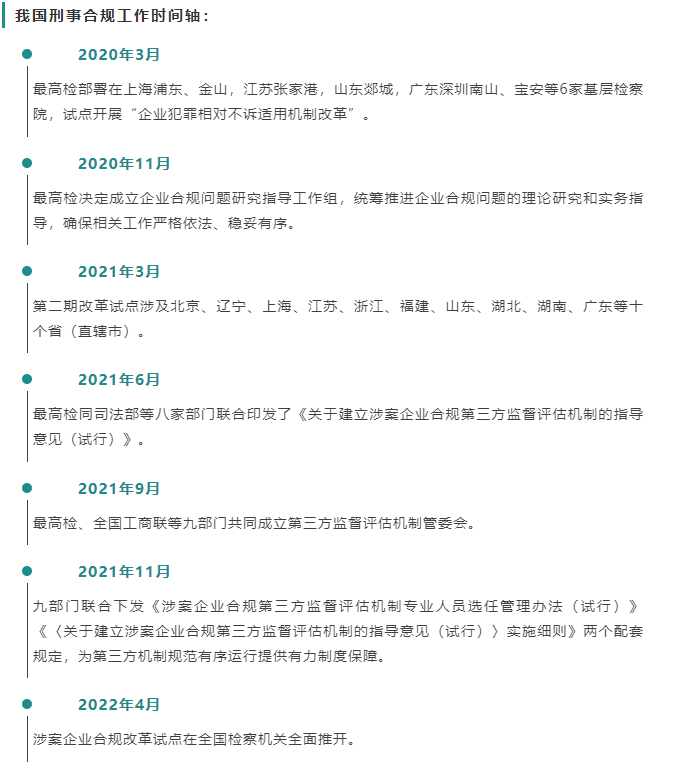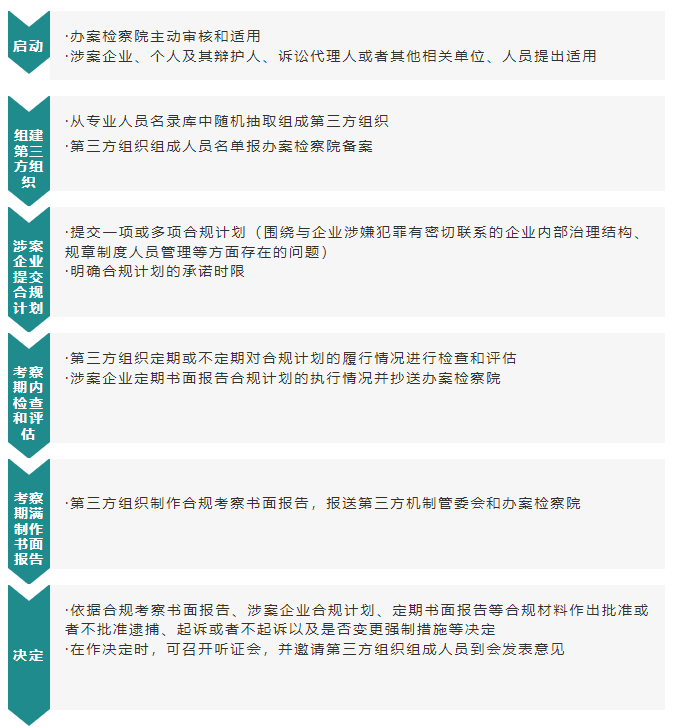Corporate Compliance Series | Procedural Essentials for Applying Criminal Compliance to Enterprises from the Top Ten Typical Cases
On the morning of April 2, 2022, the Supreme People's Procuratorate and the All-China Federation of Industry and Commerce held a special meeting to officially announce the "official announcement" - the pilot of the compliance reform of enterprises involved in the case was fully launched in the national procuratorial organs. In other words, since April 2, criminal compliance work will no longer be carried out only in pilot procuratorial organs. Procuratorial organs throughout the country can carry out criminal compliance work on enterprises involved. Currently, the procuratorial organs of 10 pilot provinces have handled 766 cases involving enterprise compliance, including 503 cases where the third-party supervision and evaluation mechanism (hereinafter referred to as the "third-party mechanism") is applicable; The procuratorial organs of some non pilot provinces have actively explored and promoted relevant work within the framework of the pilot documents based on local conditions, handling 223 compliance cases, including 98 cases applicable to third-party mechanisms. The types of cases are constantly enriched and expanded.
"The work of enterprise compliance reform refers to: when the procuratorial organ makes a decision not to approve the arrest or prosecution of criminal cases involving enterprises in accordance with the law, or proposes a lenient sentence based on the system of pleading guilty and punishment, it also urges the enterprises involved to make compliance commitments and actively rectify, promote the compliance and law-abiding operation of enterprises, and prevent and reduce enterprise violations and crimes." This article will summarize and summarize the procedural points for the application of criminal compliance in enterprises involved through the ten typical cases successively issued by the Supreme Court of Justice and the Guiding Opinions on Establishing a Third Party Supervision and Evaluation Mechanism for Compliance of Enterprises Involved in Cases (Trial Implementation) (referred to as the "Guiding Opinions").

Types of cases applicable to the compliance reform of enterprises involved
It includes various criminal cases involving the production and operation activities of market entities such as companies and enterprises, including both unit criminal cases committed by companies and enterprises, as well as criminal cases closely related to production and operation activities committed by companies and their actual controllers, management personnel, key technical personnel, etc.
In China's criminal law, there are approximately 160 counts of crimes committed by units. If a unit commits a crime, it shall be fined, and the directly responsible executives and other directly responsible personnel shall be punished. Although some cases may appear to be unit crimes, compliance testing points and third-party mechanisms are not applicable to individuals who establish companies for the purpose of committing crimes or whose main business activities are to commit crimes after the establishment of the company, who commit crimes in the name of the unit, or who are suspected of endangering national security and terrorist activities.
Compliance reform does not distinguish between the size and nature of enterprises
Whether it is a private enterprise or a state-owned enterprise, whether it is a small, medium-sized, or listed company, as long as the enterprise involved pleads guilty to punishment, is able to operate normally, commits to establishing or improving the enterprise compliance system, and has the basic conditions for starting a third-party mechanism. If it applies voluntarily, it can apply the third-party mechanism.
Basic process for applicable compliance
The issuance of the Guiding Opinions marks a new stage in the pilot work of enterprise compliance reform. The third-party regulatory mechanism for enterprise compliance refers to a third-party regulatory organization selected by the third-party regulatory mechanism management committee to investigate, evaluate, supervise, and inspect the compliance commitments of the enterprises involved when the procuratorial organ handles enterprise related criminal cases, which meet the applicable conditions for the pilot enterprise compliance reform. The investigation results serve as an important reference for procuratorial organs to handle cases according to law.
From the Guiding Opinions and ten typical cases, we can roughly summarize the overall process of applying criminal compliance:

Discovering new or unknown criminal facts will result in suspension of compliance application
"If a third-party organization discovers criminal facts or newly committed criminal acts of the enterprise or its personnel involved that have not yet been grasped by the case handling authority, it shall suspend the third-party supervision and evaluation process and report to the People's Procuratorate responsible for handling the case.".
Members of third-party organizations come from different fields and industries
In December 2021, the Management Committee of the Compliance Third Party Supervision and Evaluation Mechanism of the Enterprises Involved in the Case announced the first batch of third-party mechanism professionals, equivalent to the first batch of "national team" third-party mechanism professionals. There are 207 members, with a two-year term of employment. In February 2022, Beijing also announced the first list of 160 people. From the list of personnel published at the national level and in Beijing, the members of third-party organizations include intermediaries from law firms, accounting firms, tax agent firms, intellectual property, appraisal, etc., as well as practitioners from different industries such as finance, biology, agriculture, automobile, etc., as well as experts and scholars from the market supervision and administration bureau, intellectual property bureau, and universities.
Members of third-party organizations are supervised
Whether at the national or local level, the third-party mechanism management committee should establish a patrol inspection team to conduct on-site spot checks and follow-up supervision without prior notice on the performance of relevant organizations and personnel in the work related to the third-party mechanism. If the enterprise or relevant personnel involved in the case, during the operation of the third-party mechanism, believe that the third-party organization or its constituent personnel have improper behavior or are suspected of violating the law or committing a crime, they can report or raise objections to the management committee of the third-party mechanism responsible for the selection, or file a complaint or complaint with the People's Procuratorate responsible for handling the case.
Enterprises involved in the case can hire lawyers to participate in the entire process of compliance application
From the first case announced by the Supreme Court of Justice, the company involved hired lawyers to participate in criminal compliance. Lawyers' participation in the application of criminal compliance almost covers the entire compliance process. Firstly, lawyers can conduct a preliminary evaluation of compliance construction, comprehensively investigate corporate compliance risks, and develop detailed compliance plans; Secondly, the lawyer submits an application for applicable compliance to the case handling procuratorate based on the preliminary evaluation results; Thirdly, during the compliance review period, lawyers can at any time cooperate with members of third-party organizations, the case handling procuratorate, and other administrative organs requested by the case handling procuratorate to conduct regular or irregular spot checks on the enterprises involved, and at the same time help enterprises regularly develop written compliance plans and report on the implementation of the compliance plans. Finally, participate in the hearing organized by the case handling procuratorate or prepare a compliance report and submit it to the procuratorate.
In recent days, the Supreme Court of Public Prosecutions has also taken significant actions. It has organized research and drafted the "Measures for the Compliance Construction, Evaluation, and Review of Enterprises Involved in Cases", and has also compiled and issued the "Reference Document for the Compliance Reform Pilot of Enterprises Involved in Cases", which incorporates important content such as typical and representative compliance plans and relevant systems for enterprises involved in cases, for reference by local procuratorial organs in handling cases, in order to promote the exploration of suitable local economic and social development practices and targeted at large, medium, small Microenterprise and other different enterprise characteristics.
In short, criminal compliance is not a "gold medal for avoiding death", nor is it a "mere formality". It is really about putting forward rectification suggestions to enterprises, improving their various systems and processes, and promoting their compliance construction. Not only does it allow enterprises to "pay" for illegal activities, but it also lays the foundation for their survival and long-term development.
Related recommendations
- Can I get a tax refund if my bet fails? ——Comment on the case of Wang and Shanghai Taxation Bureau's refusal to refund taxes
- How shareholders can withdraw their shares Series 2: Company merger, division, or transfer of major assets
- From the Xiao incident to see the complex impact of spousal reporting - a double-edged sword in divorce proceedings
- Analysis of Criminal Legal Risks in Low altitude Economy and Preliminary Exploration of the Road to Criminal Compliance in Low altitude Economy


